New variants of SARS-CoV-2, vaccine immune response and the Brazilian reality
Severe acute respiratory syndrome coronavirus 2 (SARS-CoV-2), a highly pathogenic β-coronavirus, is the etiologic agent of coronavirus disease 2019 (COVID-19), which gave rise to a diffi
[...] Read more.
Severe acute respiratory syndrome coronavirus 2 (SARS-CoV-2), a highly pathogenic β-coronavirus, is the etiologic agent of coronavirus disease 2019 (COVID-19), which gave rise to a difficult to control pandemic, especially in Brazil. Approximately 4,000 mutations have been identified in SARS-CoV-2, with the majority being redundant without having any biological effect on the virus. The aim of the present study was to objectively understand how new SARS-CoV-2 variants can affect vaccine response, in addition to highlighting the current situation in Brazil in the face of the pandemic and considering epidemiological and immunological aspects of COVID-19. The main protective correlate investigated in most vaccines is the neutralizing antibody titer induced by immunizing agents, observed in the pre-clinical phase in animals, whose action is to block the binding of the spike protein to the angiotensin-converting enzyme 2 (ACE2) receptor, preventing infection. Up to the second half of 2021, the variants that are of greatest concern worldwide and require molecular surveillance are Alpha variant (or B.1.1.7 lineage), Beta (or B.1.351 lineage), Gamma (or P1 lineage) and Delta (or B.1.617.2 lineage). Brazil finds itself in a highly unfavorable scenario, with the circulation of variants of concern, mainly Gamma and Delta, with high fatality rates for COVID-19 and low vaccination rate. Given the still latent situation of the COVID-19 pandemic in Brazil, the lack of global planning for action strategies for non-pharmacological prevention measures, there is an imminent risk of the emergence of new variants due to the finding of susceptible hosts and the high proliferative rate of SARS-CoV-2. It is urgent to increase the genotyping of positive samples isolated from infected individuals, the speed of vaccination of the entire population and the unification of non-pharmacological preventive measures throughout the country.
Marileia Chaves Andrade ... Hellen Oliveira Rosa
View:1820
Download:43
Times Cited: 0
Severe acute respiratory syndrome coronavirus 2 (SARS-CoV-2), a highly pathogenic β-coronavirus, is the etiologic agent of coronavirus disease 2019 (COVID-19), which gave rise to a difficult to control pandemic, especially in Brazil. Approximately 4,000 mutations have been identified in SARS-CoV-2, with the majority being redundant without having any biological effect on the virus. The aim of the present study was to objectively understand how new SARS-CoV-2 variants can affect vaccine response, in addition to highlighting the current situation in Brazil in the face of the pandemic and considering epidemiological and immunological aspects of COVID-19. The main protective correlate investigated in most vaccines is the neutralizing antibody titer induced by immunizing agents, observed in the pre-clinical phase in animals, whose action is to block the binding of the spike protein to the angiotensin-converting enzyme 2 (ACE2) receptor, preventing infection. Up to the second half of 2021, the variants that are of greatest concern worldwide and require molecular surveillance are Alpha variant (or B.1.1.7 lineage), Beta (or B.1.351 lineage), Gamma (or P1 lineage) and Delta (or B.1.617.2 lineage). Brazil finds itself in a highly unfavorable scenario, with the circulation of variants of concern, mainly Gamma and Delta, with high fatality rates for COVID-19 and low vaccination rate. Given the still latent situation of the COVID-19 pandemic in Brazil, the lack of global planning for action strategies for non-pharmacological prevention measures, there is an imminent risk of the emergence of new variants due to the finding of susceptible hosts and the high proliferative rate of SARS-CoV-2. It is urgent to increase the genotyping of positive samples isolated from infected individuals, the speed of vaccination of the entire population and the unification of non-pharmacological preventive measures throughout the country.
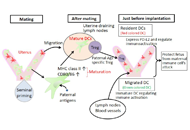 Pregnancy depends on a delicate balance of immune activation and regulationOpen AccessReviewIt is well recognized that immune tolerance is important to prevent semiallografted fetuses from rejection by maternal immunocompetent cells; however, immune activation also plays an important role [...] Read more.Shigeru Saito ... Sayaka TsudaPublished: December 31, 2021 Explor Immunol. 2021;1:461–478
Pregnancy depends on a delicate balance of immune activation and regulationOpen AccessReviewIt is well recognized that immune tolerance is important to prevent semiallografted fetuses from rejection by maternal immunocompetent cells; however, immune activation also plays an important role [...] Read more.Shigeru Saito ... Sayaka TsudaPublished: December 31, 2021 Explor Immunol. 2021;1:461–478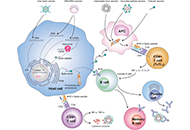 State-of-the-art preclinical evaluation of COVID-19 vaccine candidatesOpen AccessReviewThe coronavirus disease 2019 (COVID-19) results from the infection of severe acute respiratory syndrome coronavirus-2 (SARS-CoV-2) and primarily affects the respiratory tissue. Since first reported [...] Read more.Devlina Ghosh ... Abhishek SaxenaPublished: December 31, 2021 Explor Immunol. 2021;1:440–460
State-of-the-art preclinical evaluation of COVID-19 vaccine candidatesOpen AccessReviewThe coronavirus disease 2019 (COVID-19) results from the infection of severe acute respiratory syndrome coronavirus-2 (SARS-CoV-2) and primarily affects the respiratory tissue. Since first reported [...] Read more.Devlina Ghosh ... Abhishek SaxenaPublished: December 31, 2021 Explor Immunol. 2021;1:440–460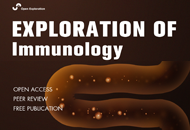 New variants of SARS-CoV-2, vaccine immune response and the Brazilian realityOpen AccessReviewSevere acute respiratory syndrome coronavirus 2 (SARS-CoV-2), a highly pathogenic β-coronavirus, is the etiologic agent of coronavirus disease 2019 (COVID-19), which gave rise to a diffi [...] Read more.Marileia Chaves Andrade ... Hellen Oliveira RosaPublished: December 31, 2021 Explor Immunol. 2021;1:432–439
New variants of SARS-CoV-2, vaccine immune response and the Brazilian realityOpen AccessReviewSevere acute respiratory syndrome coronavirus 2 (SARS-CoV-2), a highly pathogenic β-coronavirus, is the etiologic agent of coronavirus disease 2019 (COVID-19), which gave rise to a diffi [...] Read more.Marileia Chaves Andrade ... Hellen Oliveira RosaPublished: December 31, 2021 Explor Immunol. 2021;1:432–439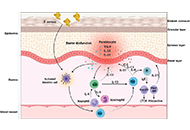 Crosstalk between keratinocytes and immune cells in inflammatory skin diseasesOpen AccessReviewCutaneous homeostasis is maintained by dynamic cellular communications between different cell types in the skin through interactions with various mediators, including cytokines, chemokines and antim [...] Read more.Xinhui Ni, Yuping LaiPublished: December 31, 2021 Explor Immunol. 2021;1:418–431
Crosstalk between keratinocytes and immune cells in inflammatory skin diseasesOpen AccessReviewCutaneous homeostasis is maintained by dynamic cellular communications between different cell types in the skin through interactions with various mediators, including cytokines, chemokines and antim [...] Read more.Xinhui Ni, Yuping LaiPublished: December 31, 2021 Explor Immunol. 2021;1:418–431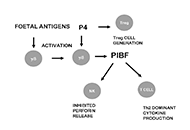 Progesterone induced blocking factor in health and diseaseOpen AccessReviewThe foetus expressing paternal antigens ought to be “rejected” by the maternal immune system. However, the immunological relationship of the mother and the foetus does not follow the rules of transplantation immunology. Matern [...] Read more.Julia Szekeres-BarthoPublished: December 31, 2021 Explor Immunol. 2021;1:406–417
Progesterone induced blocking factor in health and diseaseOpen AccessReviewThe foetus expressing paternal antigens ought to be “rejected” by the maternal immune system. However, the immunological relationship of the mother and the foetus does not follow the rules of transplantation immunology. Matern [...] Read more.Julia Szekeres-BarthoPublished: December 31, 2021 Explor Immunol. 2021;1:406–417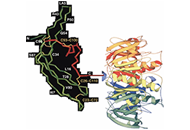 A unique vaccine for birth control and treatment of advanced stage cancers secreting ectopically human chorionic gonadotropinOpen AccessReviewThis article is a tribute and homage to Gerard Chaouat who invited me to contribute this article. My years in France have remained very memorable to me. Reviewed briefly is the vaccine that was made [...] Read more.Gursaran P. Talwar ... Krishna M. EllaPublished: December 31, 2021 Explor Immunol. 2021;1:398–405
A unique vaccine for birth control and treatment of advanced stage cancers secreting ectopically human chorionic gonadotropinOpen AccessReviewThis article is a tribute and homage to Gerard Chaouat who invited me to contribute this article. My years in France have remained very memorable to me. Reviewed briefly is the vaccine that was made [...] Read more.Gursaran P. Talwar ... Krishna M. EllaPublished: December 31, 2021 Explor Immunol. 2021;1:398–405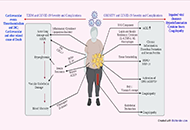 Activation of mucosal immunity and novel prophylactic and therapeutic strategy in combating COVID-19Open AccessReviewCoronavirus disease 2019 (COVID-19) emerges as an expeditiously growing pandemic, in the human population caused by the highly transmissible RNA virus severe acute respiratory syndrome of coronaviru [...] Read more.Swapan K. Chatterjee ... Maria Nilda M. MunozPublished: December 31, 2021 Explor Immunol. 2021;1:374–397
Activation of mucosal immunity and novel prophylactic and therapeutic strategy in combating COVID-19Open AccessReviewCoronavirus disease 2019 (COVID-19) emerges as an expeditiously growing pandemic, in the human population caused by the highly transmissible RNA virus severe acute respiratory syndrome of coronaviru [...] Read more.Swapan K. Chatterjee ... Maria Nilda M. MunozPublished: December 31, 2021 Explor Immunol. 2021;1:374–397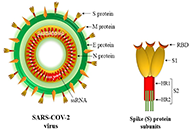 Vaccine-induced immune responses against SARS-CoV-2 infectionsOpen AccessReviewVaccination against coronavirus disease 2019 (COVID-19) is one of the most effective tools to curb the pandemic. Multiple vaccine candidates based on different platforms are available for emergency [...] Read more.Mandeep Garg ... Suruchi GargPublished: December 31, 2021 Explor Immunol. 2021;1:356–373
Vaccine-induced immune responses against SARS-CoV-2 infectionsOpen AccessReviewVaccination against coronavirus disease 2019 (COVID-19) is one of the most effective tools to curb the pandemic. Multiple vaccine candidates based on different platforms are available for emergency [...] Read more.Mandeep Garg ... Suruchi GargPublished: December 31, 2021 Explor Immunol. 2021;1:356–373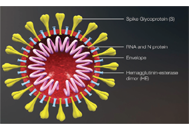 COVID-19 vaccine and immune responseOpen AccessReviewSevere acute respiratory syndrome coronavirus 2 (SARS-CoV-2; βCoV), the causative agent of coronavirus disease 2019 (COVID-19), causes severe lower respiratory tract infections and acute [...] Read more.Sevilay Hintistan, Hatice DemirağPublished: December 31, 2021 Explor Immunol. 2021;1:341–355
COVID-19 vaccine and immune responseOpen AccessReviewSevere acute respiratory syndrome coronavirus 2 (SARS-CoV-2; βCoV), the causative agent of coronavirus disease 2019 (COVID-19), causes severe lower respiratory tract infections and acute [...] Read more.Sevilay Hintistan, Hatice DemirağPublished: December 31, 2021 Explor Immunol. 2021;1:341–355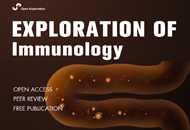 Preeclampsia—an immune disease? An epidemiologic narrativeOpen AccessReviewThe maternal syndrome preeclampsia is triggered by syncytiotrophoblast (STB) stress; the heterogeneity of the syndrome is caused by the different pathways leading to this STB stress. Inflammation pl [...] Read more.Gustaaf Albert Dekker, Pierre Yves RobillardPublished: December 31, 2021 Explor Immunol. 2021;1:325–340
Preeclampsia—an immune disease? An epidemiologic narrativeOpen AccessReviewThe maternal syndrome preeclampsia is triggered by syncytiotrophoblast (STB) stress; the heterogeneity of the syndrome is caused by the different pathways leading to this STB stress. Inflammation pl [...] Read more.Gustaaf Albert Dekker, Pierre Yves RobillardPublished: December 31, 2021 Explor Immunol. 2021;1:325–340